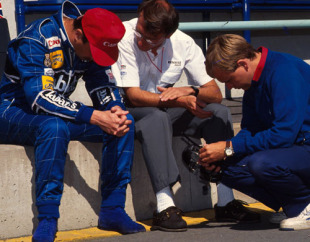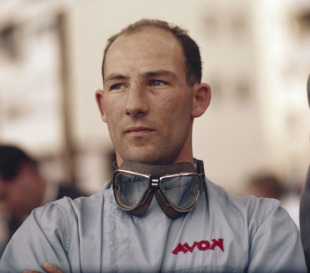
- Drivers:
- Chris Amon
- |
- René Arnoux
- |
- David Coulthard
- |
- Andrea de Cesaris
- |
- Nick Heidfeld
- |
- Stefan Johansson
- |
- Heikki Kovalainen
- |
- Nigel Mansell
- |
- Stirling Moss
- |
- Didier Pironi
- |
- Alain Prost
- |
- Maurice Trintignant
Has anyone ever led throughout a Grand Prix only to lose the lead - and the race - on the final lap? asked Tom Wilson from Islington
I think the first driver to suffer this particular misfortune is Britain's own Nigel Mansell, in the Canadian Grand Prix of 1991. Mansell beat the pole-sitter, his Williams team-mate Riccardo Patrese, off the line in Montreal, and settled in to what appeared to be a commanding lead. On the last lap, having led the whole way, Mansell was enjoying the applause and adulation from the crowd ... a little too much. Going round the hairpin near the finish he was waving to the spectators, allowed his revs to drop too low, and the engine stalled (some versions of this story have Mansell accidentally flicking off the ignition switch while waving, and others blame the car's electronics and not the driver: probably only Nigel and the Williams team know the truth!). A surprised and delighted Nelson Piquet swept past to win the race for Benetton. Meanwhile the rather embarrassed Mansell never did get his car started again, and was classified sixth. It also happened, more controversially, at the Austrian GP in 2002, when Rubens Barrichello led the whole race before letting his team-mate Michael Schumacher pass about 50 yards from the finishing line as Ferrari applied team orders.
Stirling Moss drove in many different makes of car during his Grand Prix career - I counted ten. Has anyone ever driven more different cars? asked Lawrence Henderson from Oxford
You're right, Sir Stirling Moss did pilot ten different makes of car in Grands Prix - pretty good going when you consider he only started 67 races. The cars he drove were: HWM, ERA, Connaught, Cooper, Maserati, Mercedes, Vanwall, BRM, Lotus, and Ferguson. The Ferguson drive was unusual: he took over the car during the 1961 British GP after his own Lotus broke down, but was soon disqualified for receiving outside assistance. Three other drivers - Andrea de Cesaris, Stefan Johansson and Maurice Trintignant - raced in ten different types of car, but the overall winner here actually raced no fewer than 13 different marques: in a 108-race career that started in 1963 Chris Amon drove for Lola, Lotus, Brabham, Cooper, Ferrari, March, Matra, Tecno, Tyrrell, Amon (his own team), BRM, Ensign, and finally (in 1976) Williams. Amon, who's now 67, is generally considered one of the unluckiest of all GP drivers: he finished on the podium 11 times, but never won a Grand Prix.

Well, as David Cameron might say at Prime Minister's Questions, I refer you to my previous answer: "DC" did indeed win 13 races without ever winning the F1 title, but Sir Stirling Moss won 16 between 1955 and 1961. He famously never won the drivers' championship, although he was runner-up four times - lastly in 1958, when he won four GPs, as against one by the eventual champion, Mike Hawthorn.
Who has finished the most successive Grands Prix without retiring or crashing? asked Ken Lacey from Derby
The record for consistency goes to Nick Heidfeld, who recently regained a place on the F1 grid with Sauber. After being forced to retire his BMW-Sauber at the 2007 United States GP at Indianapolis with a transmission problem, Heidfeld reached the end of the remaining ten races of that season, all 18 GPs in 2008, and the first 13 of 2009 until he was forced out of the Singapore GP following a collision with Adrian Sutil. He thus finished 41 successive races.
The Race of Champions never seems to be won by an F1 driver. Has one ever won it? asked Karen Grover from Kent
The Race of Champions, which pits drivers of various descriptions against each other in identical cars, has taken place since 1988 - and only one Grand Prix driver has ever won it, and even he was not in F1 at the time. That was the Finn Heikki Kovalainen, in 2004, three years before his first Grand Prix start with Renault. In 2009 there were three F1 men in the semi-finals - Jenson Button, Michael Schumacher and Sebastian Vettel - but the winner, who just pipped Schumacher in the final, was the Swede Mattias Ekstrom, the two-time winner of the DTM (the German touring car championship).
There are a lot of German drivers in F1 this year, so it's theoretically possible that there could be an all-German 1-2-3 in a race. When was the last time one country monopolised the podium? asked Andy Clarke from Daventry
The last time this happened was as long ago as 1982, when appropriately enough there were three French drivers on the podium at the French GP at the Paul Ricard circuit near Le Castellet. Rene Arnoux led the field home, ahead of his Renault team-mate Alain Prost, with Didier Pironi third in a Ferrari. Just to complete the locals' day Patrick Tambay, another Frenchman, was fourth in the second Ferrari. Behind the scenes the delight wasn't quite universal, though: Prost claimed Arnoux had defied team orders by staying ahead of him. The last time Britons completed a 1-2-3 in a Grand Prix was back in 1968, when Jackie Stewart won the United States GP at Watkins Glen in a Matra, ahead of Graham Hill (Lotus) and John Surtees (Honda).
If you want to ask Steven a question, use our feedback form. The most interesting questions will be answered here every other Friday. His long-running Ask Steven column on Cricinfo remains one of that site's most popular features
© ESPN Sports Media Ltd.
 If you want to ask Steven a question, use our feedback form. The most interesting questions will be answered here every other Friday. His long-running Ask Steven column on Cricinfo remains one of that site's most popular features Ask Steven features a number of experts, headed by Steven Lynch, who answer your questions across Formula One as well as a variety of other sports
If you want to ask Steven a question, use our feedback form. The most interesting questions will be answered here every other Friday. His long-running Ask Steven column on Cricinfo remains one of that site's most popular features Ask Steven features a number of experts, headed by Steven Lynch, who answer your questions across Formula One as well as a variety of other sports

